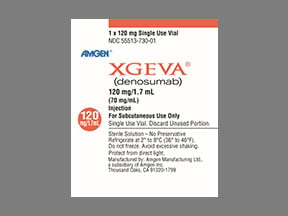
Xgeva Coupons & Savings Card – Discount Prices from $3417.58
My prescription
Edit
1.7ML of 120MG/1.7ML, Xgeva (1 Vial)
Select pharmacy

Albertsons
$3417.58
COUPON PRICE
Walgreens
$3646.59
COUPON PRICE
Walmart
$3695.76
COUPON PRICEXgeva savings card
Show this card to your pharmacist
Albertsons
$3417.58
BIN
ID
PCN
GRP
019876
LH66BDACD8
CHIPPO
LHX
Powered by
Related RANKL inhibitors prescriptions
More prescriptions for prostate cancer
Related RANKL inhibitors prescriptions
More prescriptions for prostate cancer
Price history for Xgeva
1 Vial, 1.7ML of 120MG/1.7ML
Average retail price for Xgeva
Average SaveHealth price for Xgeva
Our price history data is based on aggregated prescription data collected from participating pharmacies in America. Our prescription data updates daily to reflect the latest price changes. If you notice a missing data point, it means there wasn't sufficient data available to generate a monetary value for that date.
*Retail prices are based on pharmacy claims data, and may not be accurate when we don't have enough claims.
Xgeva dosage forms
Dosage Quantity Price from Per unit 1.7ML of 120MG/1.7ML 1 Vial $3417.58 $3417.58 1.7ML of 120MG/1.7ML 2 Vials $6820.16 $3410.08 1.7ML of 120MG/1.7ML 3 Vials $10222.74 $3407.58
| Dosage | Quantity | Price from | Per unit |
|---|---|---|---|
| 1.7ML of 120MG/1.7ML | 1 Vial | $3417.58 | $3417.58 |
| 1.7ML of 120MG/1.7ML | 2 Vials | $6820.16 | $3410.08 |
| 1.7ML of 120MG/1.7ML | 3 Vials | $10222.74 | $3407.58 |
What does Xgeva do to teeth?
Xgeva (denosumab) can potentially lead to a condition called osteonecrosis of the jaw (ONJ), which is a serious condition that affects the jawbone. Patients taking Xgeva should maintain good oral hygiene and have regular dental check-ups. It is important to inform the healthcare provider about any dental procedures, as these may increase the risk of developing ONJ.
How much does a shot of Xgeva cost?
The cost of a shot of Xgeva can vary depending on factors such as location, insurance coverage, and the healthcare provider. On average, the price can range from $1,800 to $2,500 per injection without insurance. It is advisable for individuals to check with their healthcare provider or insurance company for specific pricing and coverage details.
How much does a denosumab injection cost?
The cost of a denosumab injection can vary widely depending on factors such as the location, the healthcare provider, and whether the patient has insurance coverage. Without insurance, the price can range from several hundred to over a thousand dollars per injection. Patients are advised to check with their healthcare provider or insurance company for specific pricing and coverage details.
Does Xgeva cause dental problems?
Yes, Xgeva (denosumab) can cause dental problems. One of the potential side effects is osteonecrosis of the jaw, a condition where the jawbone starts to weaken and die. It is important for patients to maintain good oral hygiene and have regular dental check-ups while on Xgeva. They should inform their healthcare provider if they experience any dental symptoms such as pain, swelling, or loose teeth.
What are the side effects of denosumab on teeth?
Denosumab can potentially lead to side effects related to dental health, including osteonecrosis of the jaw (ONJ). This condition involves the death of bone tissue in the jaw and can occur after dental procedures or spontaneously. Patients taking denosumab are advised to maintain good oral hygiene, have regular dental check-ups, and inform their dentist about their medication use. It is also recommended to complete any invasive dental procedures before starting treatment with denosumab to minimize the risk of ONJ.
